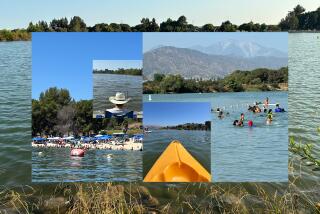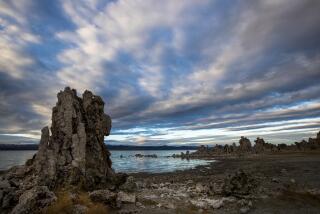Town Balances Pollution Against Price of Progress
- Share via
In 1980, Los Angeles County health officials determined that there was something seriously wrong with Lake Hughes.
The lake, cradled in chaparral-covered mountains northeast of Castaic in the small unincorporated town of Lake Hughes, was polluted by runoff from dozens of the community’s aging septic tanks. The county declared the lake a health hazard to the water skiers, swimmers and catfish-anglers who flocked to it.
Government officials explored ways to clean up the lake. The state Regional Water Quality Control Board imposed a building moratorium to halt growth that could lead to more sewage seeping into the water.
Seven years later, however, the 135-acre lake, tinged green by algae, still is polluted. And people continue to swim and fish in it.
“It’s a well-known hazard,” said Dr. Shirley Fannin, associate deputy director of the communicable disease control program of the county’s Department of Health Services. Fannin noted that anyone who touches the water may contract illnesses such as hepatitis A, salmonella and diarrhea.
A solution, though, seems close.
Sewage Plant Planned
After securing promises for $3 million on the federal, state and county levels, the Los Angeles County Board of Supervisors is expected to hold a public hearing this spring to determine whether a waste-water treatment facility, to replace Lake Hughes’ septic tanks, should be built.
The plant, which would donate its treated sewage water to a nearby golf course’s sprinklers, could be completed in late 1988 or early 1989.
Since 1980, the lake’s cleanup has been stalled by many factors, including controversy that polarized the faded resort town.
Members of the homeowners association wanted a new sewage system so badly that they began holding hamburger feeds, chili dog festivals, yard sales and Las Vegas nights. Some of the $18,000 they raised in 1984 was spent on engineering studies for a sewage system.
These activists worried that the county might condemn properties near the lake if contaminated water still drained into it, and they wanted to reinvigorate a depressed real estate market.
“We know it’s a time bomb ready to explode,” said Elva Reisner, a homeowner board member. “The county had told us that. The county had talked about condemnation if ever disease broke out.”
Fears of Expense
Yet many older residents in the town, where many elderly live, have worried that the user fees for a sewage plant would be prohibitive and force them from their homes. Others predicted that new sewers would lead to a building boom, prompting a stampede of new neighbors who would endanger Lake Hughes’ rural serenity.
“We’re kind of glad the sewers aren’t in; it keeps the area quaint,” said Peggy Dehaus, a real estate agent who lives in a baby blue clapboard house overlooking the lake.
Officials say the limited capacity of the proposed treatment plant would keep the town small.
The project also has been delayed by a long search for adequate government funds and the area’s terrain, said Carlos Jackson, director of the county’s community development block grant division. The town and lake are on the San Andreas Fault, making the search for a site tricky, he said.
Meanwhile, no government agency has stopped people from using the lake, a habitat for waterfowl and cattails. The absence of posted signs has generated skepticism among many townsfolk who wonder aloud if the pollution problem has been overblown. Nonetheless, most residents say they now only enjoy the lake from a distance and that it is the out-of-towners who continue to use it.
Aging Resort Town
Historically, Lake Hughes has served as an oasis for weekenders. More than 60 years ago, city dwellers discovered the area, which according to local folklore had been a favored place in earlier times of gold and graphite miners, and stagecoach bandits who hid in the mountains.
Today, Lake Hughes has lost its draw as a resort town--80% of the Depression-era cabins and modest homes that ring the lake are occupied by permanent residents.
But the tourists still come, and many--up to 400 on a summer holiday weekend--end up at Hughes Lakeshore Park, the only campground on the lake’s beach. Lou Foster, one of the owners of the family-run campground, said the health department has never told her to avoid swimming in the lake.
“My children swim in that lake every day in the summer,” she said. “Believe me, if I didn’t think it was safe, I wouldn’t let them.”
The lake’s private ownership is given as one reason that the county health department has not posted signs.
When an algae buildup triggered a fish kill several years ago, the state and county fought over who owned the lake and hence was responsible for getting rid of the smelly mess. Attorneys for the state and county finally decided to classify it as a privately owned lake.
Regarding posting signs for swimmers, Norman Groom, the county’s chief environmental officer with the mountain and rural section, said, “It’s not our policy to post every body of water that doesn’t meet swimming requirements.” Of Lake Hughes, he added, “First of all, it’s not county property. Second, it’s not a formalized swimming area.”
To be classified as a public swimming area, a lake must meet several criteria, Groom said. For instance, lifeguards would have to be on duty and fees would have to be charged to use the lake, he said.
If it were categorized as public, Groom acknowledged, “We’d probably shut it down.”
Status Found Annoying
The eagerness of state and local governments to disown the lake has seemed to rile some people more than the pollution.
“We have a lake that doesn’t belong to anybody,” complained Larry Martin, owner of Papa’s Country Store, which stocks bait, poles and tackle. “Nobody wants the problem.”
A winter visitor to Lake Hughes probably would not suspect it is a health menace. The sole clue is its unusually green cast. In the winter, the only odor at the lake comes from logs burning in fireplaces.
In summer, however, when the sun beats down on the lake, it can stink, residents say.
Opposition to the sewer project seems to be evaporating, observed David R. Vannatta, an aide to county Supervisor Mike Antonovich, who represents the area. And most residents interviewed agreed.
“We don’t want to ram this down people’s throats,” said Vannatta, who has been working with the county’s Community Development Commission to make the sewer proposal more economical to accommodate those on fixed incomes.
Less Costly Now
Residents say they were aghast at the high cost first quoted to them as their assessment for the sewage system. But the county eventually found a cheaper treatment method, whittling each homeowner’s probable users’ fee to about $32 a month.
Still, there are some holdouts.
One is Dora G. Lehner, a widow who lives with her Yorkshire terrier in a lakeshore stucco home filled with her homemade braided and hooked rugs. From her back porch, she feeds stale bread to her regulars--three white geese and a cinnamon goose--and watches blue crane swallow fish whole.
“I will live in fear of losing my home,” Lehner said. “It’s lovely up here. The view is beautiful. We don’t want to go.”
But Lehner’s 85-year-old next-door neighbor welcomes change. Edwin B. Alderman, who lived in Burbank before he retired, doesn’t see his grandchildren as much since the lake is now off limits.
“I enjoyed people coming up and having a good time,” Alderman said. Now, he lamented, “Its a dead community.”
More to Read
Sign up for Essential California
The most important California stories and recommendations in your inbox every morning.
You may occasionally receive promotional content from the Los Angeles Times.










